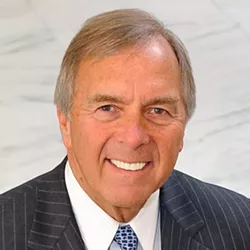No one, especially not Democrats, can say Republicans don't support diversity — just consider the wide array of 2016 Republican presidential candidates! And, no one can say Republicans don't have a sense of humor — just look at Donald Trump's candidacy! Using my years of political experience and wisdom, I'll handicap in this and future columns the various presidential candidates' chances in 2016, starting here with a review of the four most unlikely winners, each having either run before — and lost — or teased us about running.
RICK SANTORUM, a former Pennsylvania senator having run for president almost twice — and now nearly a third time — doesn't seem to know when to call it quits. He first flirted with running after the 2008 elections and ran full force in 2012, receiving about 4 million primary votes. (129 million votes were cast in 2012's presidential election, with Mitt Romney receiving nearly 61 million.)
Going into 2016, Santorum cites as his priorities a yet-to-be-revealed 20/20 tax plan, fighting radical Islam, immigration reform that protects American workers, fighting for conservative values, supporting common sense, not Common Core, valuing the dignity of human life and ending immoral spending in Washington, D.C.
MIKE HUCKABEE, a former Arkansas governor, Baptist minister and FOX News host, ran in 2008 for president, and is back in the race for 2016. His top issues: oppose abortion and support life, support the death penalty and character education, support energy independence and oppose "cap and trade," support self-defense and concealed carry, oppose Obamacare, oppose same-sex marriage and homosexuality, oppose illegal immigration and teaching of evolution, support the Afghanistan war and Christian religious principles. Though he won seven primary states in 2008, he quit the race in early March for lack of support.
RICK PERRY, a former long-serving governor of Texas and a 2012 presidential candidate, recently threw his hat into the ring, touting his record in Texas of balancing the state budget for 14 years, creating 2.2 million jobs and cutting taxes 75 times. A former Air Force veteran and farmer, Perry has a strong economic record, yet showed himself uncomfortable on the national stage in 2012, heavily criticized for forgetting an answer to a debate question. He enters the 2016 race with that lingering impression on the minds of some voters and much of the national press.
DONALD TRUMP, a billionaire, television personality and entrepreneur who's flirted with the presidency since the 1980s, brings a dramatic, superficial element to the race. Always a showman — some would say a huckster — Trump knows how publicity works and will use every opportunity to highlight his conservative yet inconsistent views, sometimes effectively expressing the electorate's frustration with government and failed leaders, but also lacking any record that instills confidence that he could do the job of president.
Entertaining though he'll be, Trump will not have broad support to match his broad wealth. He'll likely grab headlines without offering realistic solutions or a vision in which voters can have confidence. Never having held public office, but ever the public figure, he lacks a serious political record worth following — his hairdo may be taken more seriously than his candidacy. (Now that's a phenomenon.)
In 1992, another billionaire candidate — Ross Perot — received almost 19 percent of the national vote, skewing the presidential election for Bill Clinton. He had many simple solutions and creative phrases (tough talk), too, minimizing the American government's complexity and the difficulty of the presidency.
While this tier of candidates has its share of accomplishments, is successful and has valid political views on many issues of the day, it's open to speculation why they're running, as their chances of winning are quite small. The public has already seen them as candidates, and none has prospered. Perhaps it's the attention-getting nature of seeking the presidency that drives them. Or perhaps their candidacies will result in book sales or more television appearances, making these candidates relevant. More likely, it's a lack of humility — and an outsized ego — that tells them, "Why not me for president?"
Trustworthiness and integrity will be critical issues in the 2016 elections. With both Congress and the president struggling to win public support, voters will use trust, dependability, honesty, integrity and a proven record as barometers. Candidates who present themselves as qualified to address the nation's economic challenges, bolster America's diminished status worldwide, present a picture of what an inclusive America would look like and address America's three most pressing problems — weak American education, difficult economic conditions and threats to world peace — will appeal to 2016 voters, regardless of party affiliation.
Weird hairdos and right-wing-only conservatism will not rule the day, so these four, in my analysis, are out. Next week, I'll take a look at four more outlier GOP candidates. ♦





















